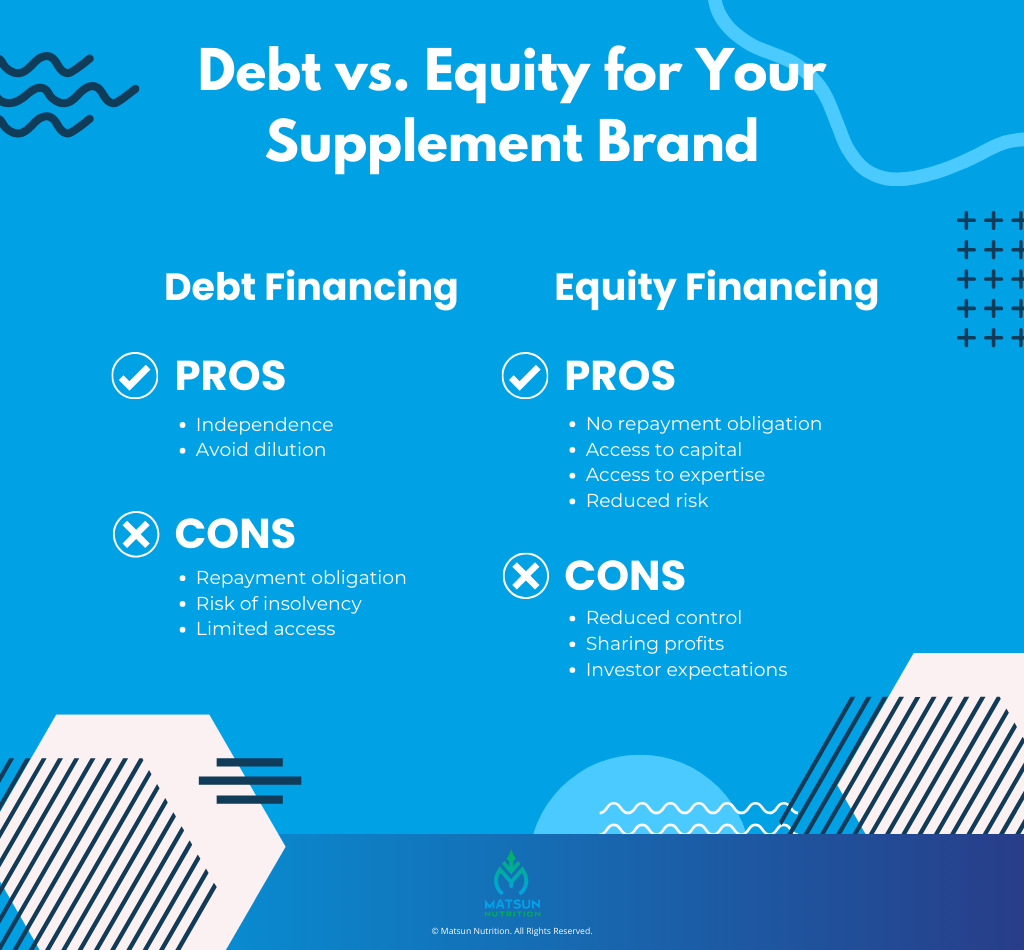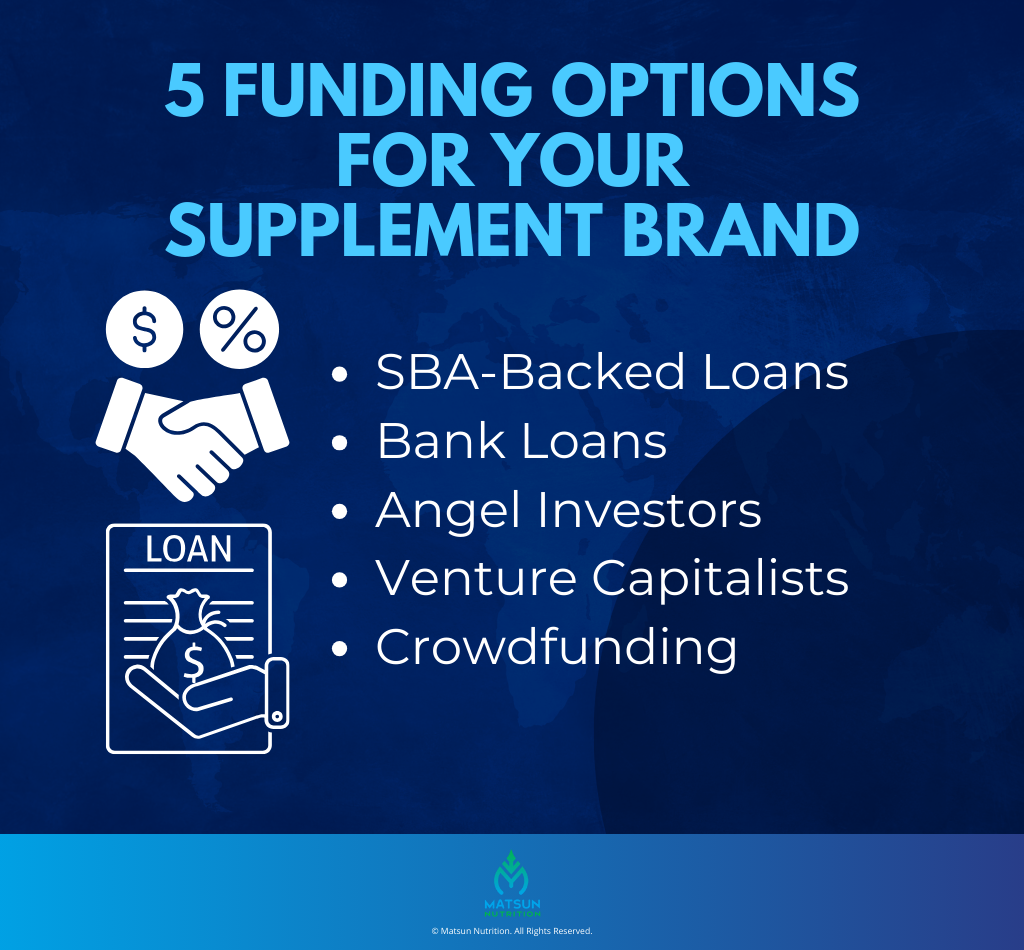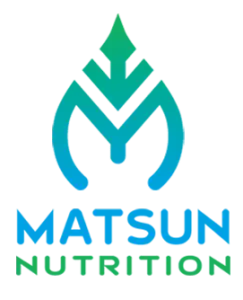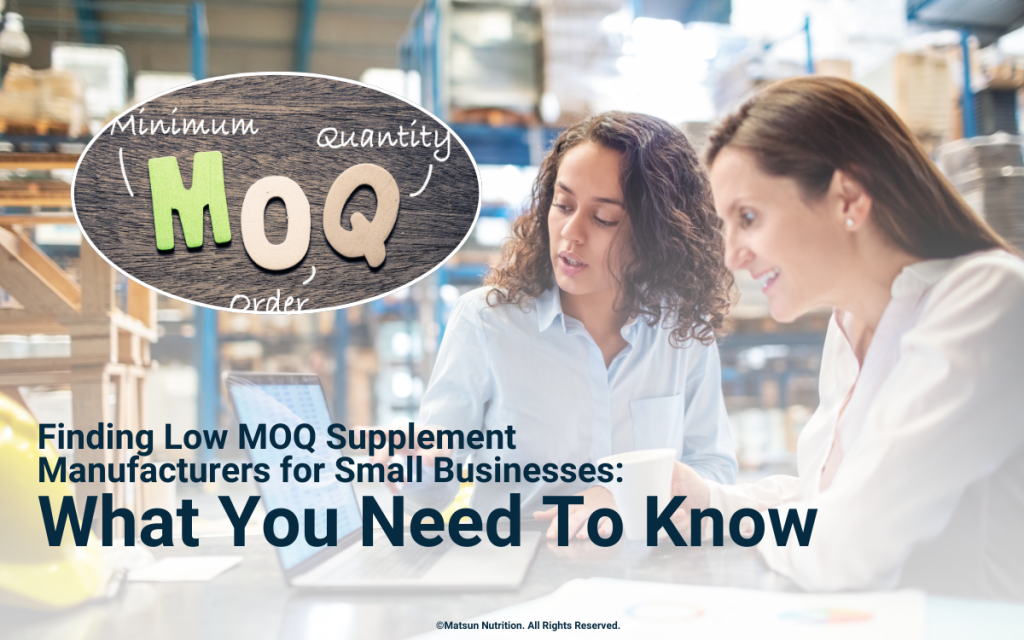The global dietary supplements market was valued at $164 billion in 2022, and it’s forecasted to reach $327.4 billion by 2030. If you’re a budding entrepreneur looking to capitalize on the growing demand for supplements, you’ll require one crucial ingredient to launch your business: capital.
In this article, we’ll explore various avenues for securing funding for your supplement brand. Whether you’re just starting out or have an established business seeking expansion, we’ll provide essential tips on how to find investors for your supplement brand.
Debt Financing vs Equity Financing

There are primarily two financing options you can explore to raise to start your supplement brand: debt financing and equity financing. Each approach has its pros and cons, and the right option for you will depend on your circumstances and financial goals.
Debt Financing
Debt financing involves borrowing money from lenders like banks, credit unions, or even friends with the commitment to repay the loan, typically with interest within a specified period.
Pros
- Independence: You maintain complete ownership and control of your business, as you’re not giving up any equity.
- Avoid dilution: Your ownership stake remains undiluted, so you won’t have to share profits with external investors.
Cons
- Repayment obligation: You’re legally obligated to make timely repayments, which can strain your cash flow, especially during the early stages of your business.
- Risk of insolvency: Your company could face insolvency or potential liquidation if you default on the loan.
- Limited access: You might struggle to get financing from certain institutions if you don’t have a good credit score or limited credit history.
Equity Financing
Equity financing involves selling shares in your company to investors like venture capitalists or angel investors in exchange for capital.
Pros
- No repayment obligation: You don’t have to repay the money you receive from equity investors.
- Access to capital: Equity financing offers access to a larger pool of capital compared to debt financing.
- Access to expertise: Many equity investors are successful entrepreneurs who can offer you invaluable insights.
- Reduced risk: Equity investors share in the financial risks of your business, potentially reducing your financial burden.
Cons
- Reduced control: Selling a portion of your company’s ownership to investors requires ceding some control to them.
- Sharing profits: Investors receive a share of your company’s profits, reducing your earning potential.
- Investor expectations: Equity investors may have a huge say in the company’s direction, which could impact your business decisions.
When it comes to debt and equity financing, there’s no right or wrong option. The right option for your business will depend on your business model, risk appetite, growth aspirations, and more.
If you want to maintain control over your business and are confident in settling the loan, debt financing may be a viable option. However, equity financing could be a better option if you want access to significant capital and don’t mind ceding some control.
5 Funding Options for Your Supplement Brand

Now that you’re familiar with the different funding options, here are some avenues worth exploring to raise capital for your supplement business:
1. SBA-Backed Loans
The Small Business Administration (SBA) provides government-backed loans through participating lenders, supporting small businesses. SBA loans boast favorable terms, such as low-interest rates and long repayment periods, making them ideal for businesses in need of a financial boost to start a private label supplement line.
Advantages
- SBA loans have favorable terms, such as low-interest rates, compared to traditional bank loans.
- SBA provides comprehensive support and resource centers to small businesses.
- Small and large loan amounts are offered.
Disadvantages
- The application process can be tedious, as it requires detailed documentation.
- Loan approval may take a long time and depends on your company’s financial performance and creditworthiness.
- SBA loans typically have collateral requirements, such as a home or car
- SBA loans come with personal liability, meaning you’ll have to settle the loan if the business can’t.
2. Bank Loans
Banks offer a variety of loan products tailored to particular business needs, like manufacturing funds, term loans, and lines of credit. However, if you apply for a bank loan, ensure you have a solid business plan and good credit history to increase your chances of obtaining funding. Also, don’t settle for the first bank that offers a good deal. Shop around and compare interest rates across various banks before settling for one.
Advantages
- Banks offer various loans tailored to specific business needs.
- Some banks offer favorable interest rates and repayment terms.
- Building a solid relationship with a bank can result in ongoing support.
Disadvantages
- Bank loans typically have stricter credit requirements and may require collateral.
- While interest rates vary from bank to bank, some bank loans may be considerably higher than SBA-backed loans.
- The approval process can take a long time.
3. Angel Investors
Angel investors invest in early-stage businesses in return for equity in them. They may also provide advice and mentorship to help your business grow.
While angel investors may be a great source of capital for your business, many typically want to make significant returns on their investments. So, to convince them to invest in your business, you’ll need to provide a strong business plan, a compelling market opportunity, and a clear path to profitability.
Advantages
- Potential access to a large pool of funding.
- Access to mentorship and advice from seasoned investors.
- Validation of your business concept from experienced investors.
Disadvantages
- Angel investors provide funds in exchange for equity in the business, which requires giving up some control over the business.
- Some angel investors may have somewhat unrealistic expectations for rapid growth and high returns in a short period.
- Finding, pitching, and securing angel investors can be challenging and time-consuming.
4. Venture Capitalists
Venture capitalists (VCs) are investors on the lookout for high-growth businesses, and if your supplement brand meets their expectations, they could be a boon for your business. VCs inject substantial capital into businesses, typically in exchange for equity. However, unlike angel investors, they often have a higher risk appetite and are willing to invest in novel ideas.
Advantages
- Access to significant capital to fuel rapid growth and expansion.
- Expertise and guidance from experienced venture capitalists in the industry.
- Reduced strain on cash flow.
Disadvantages
- VCs generally invest in businesses in exchange for a huge ownership stake, giving them substantial control over the business.
- VCs typically have high expectations for growth and favor aggressive expansion strategies.
- Obtaining VC funding is relatively difficult, as VCs usually have rigorous selection criteria.
5. Crowdfunding
If your business already has a loyal customer base, you might want to consider crowdfunding. Crowdfunding platforms like Kickstarter and GoFundMe allow you to raise capital from a large group of individuals through online fundraising campaigns. Crowdfunding can be particularly effective if you want to raise small amounts of funding or build a community of supporters.
Advantages
- Access to a wide pool of capital without relinquishing ownership.
- Opportunity to test market demand and generate early product buzz.
- Presents an opportunity to build a community of loyal supporters and potential clients.
Disadvantages
- Crowdfunding campaigns require significant effort and preparation to create a compelling campaign that grabs attention and sways people to donate.
- The amount of funding raised can vary considerably.
- Crowdfunding platforms usually charge fees for successful fundraising campaigns.
6. Other Sources of Funding
Besides the funding options explored above, some other sources of funding you could explore include:
- Industry-specific grants: Many organizations and foundations offer grants focused on areas like health and wellness and food and nutrition.
- Product development grants: Government institutions and non-governmental organizations offer grants to support the development and testing of new supplement products and custom formulations.
- Accelerator and incubator programs: These programs can provide funding, mentorship, and advice for early-stage supplement brands.
Conclusion
Raising funds for your supplement business won’t be a walk in the park. So, don’t get discouraged if you can’t get an investor right away. Often, finding the right investor involves finding one that aligns with your business needs and personal aspirations.
At Matsun Nutrition, we enable early-stage supplement brands to start their operations easily with low minimum order quantities of just 12 bottles and free label designs for all private label orders. Ready to launch your supplement brand and tap into the rising demand for supplements? Contact us today to get a free quote.
FAQs
The right source of funding for your supplement brand will depend on your specific needs and circumstances. However, some popular options include SBA-backed loans, bank loans, angel investors, venture capitalists, and crowdfunding.
The right financing option for your supplement brand will depend on your business needs, growth aspirations, and risk appetite. If you want to maintain growth, debt financing options like bank loans could be ideal. Conversely, if you don't mind giving up some control in exchange for substantial capital, equity financing options like venture capitalists might be better suited for you.
Your business must fulfill certain requirements, such as being a for-profit business with a clear business plan. It must also have a good credit history.
You can attract angel investors by creating a compelling pitch that not only showcases the financial viability of your supplement brand but also highlights its unique value proposition.
Before pitching to venture capitalists, ensure your brand has a solid foundation. Perform rigorous market research, develop a scalable business model, and provide a clear roadmap for growth.



